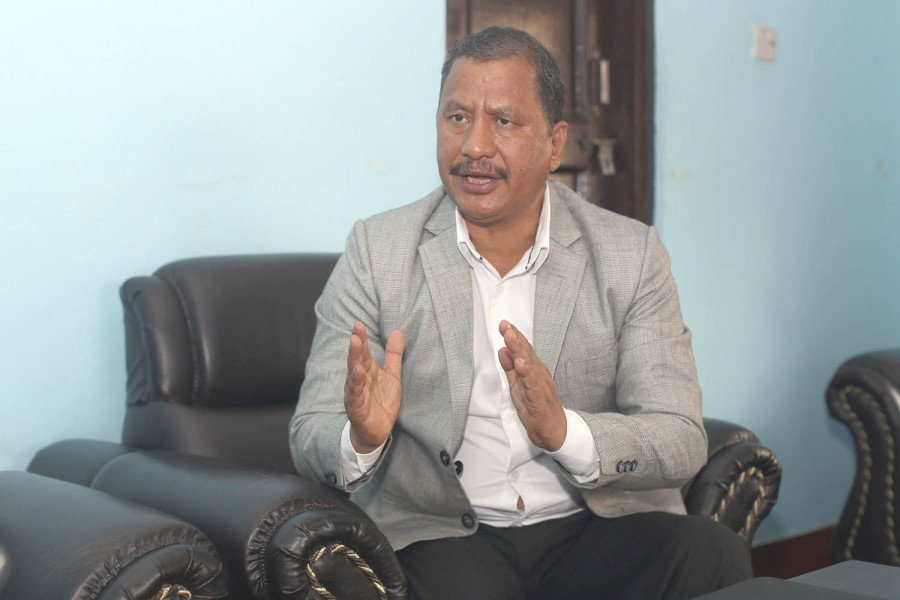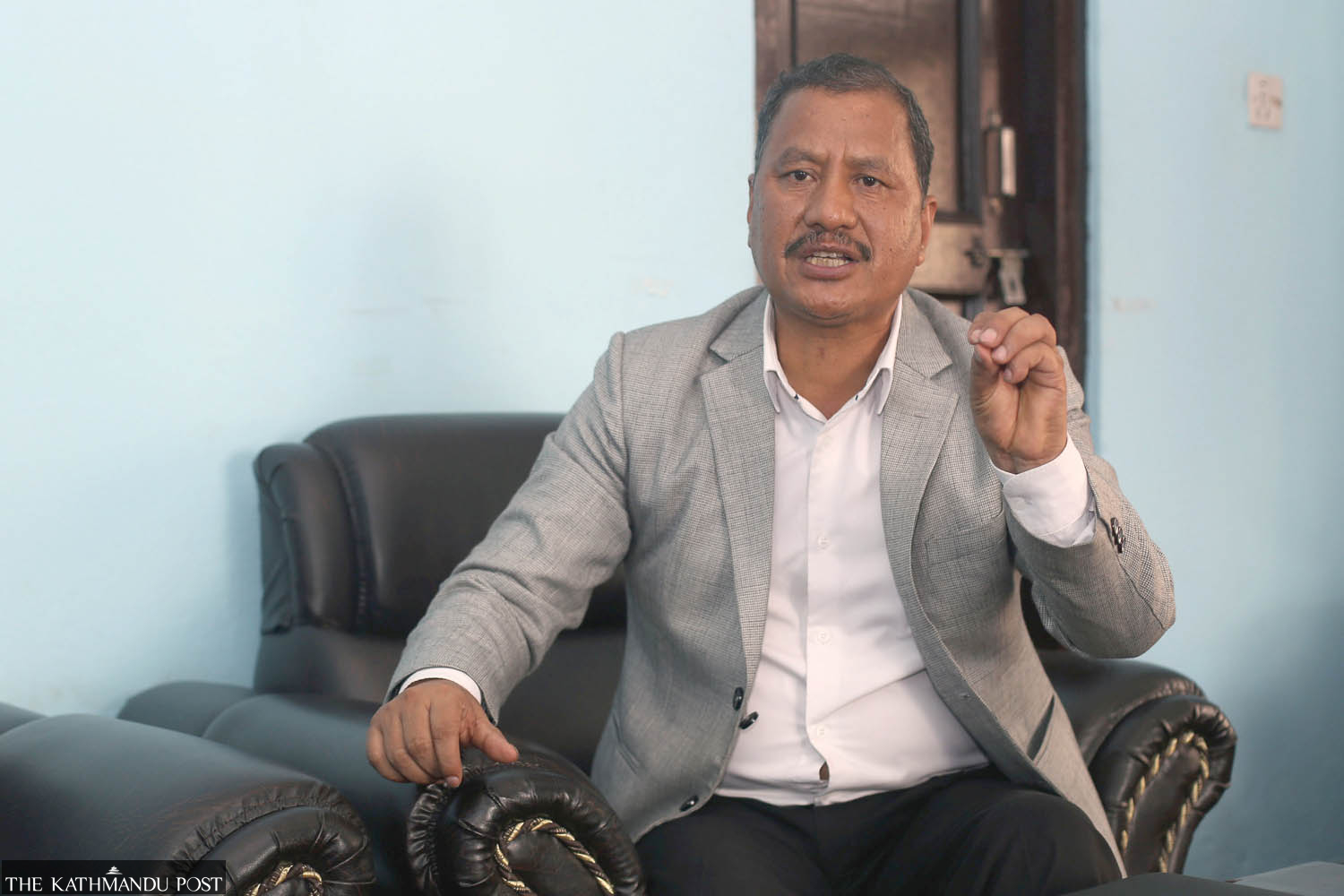Interviews
‘Parties in Socialist Front know parliamentary system doesn’t work’
Netra Bikram Chand ‘Biplav’, general secretary of the Communist Party of Nepal, on a host of issues including the Socialist Front and the party’s opinion on the MCC and the BRI.
Tika R Pradhan
The formation of the Socialist Front including Netra Bikram Chand ‘Biplav’ led Communist Party of Nepal—a party that wants to overthrow the current parliamentary system—has created a kind of ripple in Nepali politics. The front’s coming into being thus roused suspicions of both the major parties: the Nepali Congress and the CPN-UML. In this context, Post’s Tika R Pradhan talked to Chand on a host of issues. Excerpts:
What are Netra Bikram Chand ‘Biplav’ and his party doing right now?
Nowadays we are working to bring political stability. At a time when there is a struggle between good governance and chaos, we are working in the political sector to lead the country towards good governance, stability and prosperity.
You were recently seen in paddy fields with peasants. Why were you there? What is your strategy?
Nepalis want an independent, self-sufficient and prosperous country. For this we need the world’s support. But we can also deploy our own resources. For this, it is our responsibility to productively use our labour force and we believe that we can bring prosperity to our lives through production. To be a self-sustaining country, we need to develop an independent economy, production, parties, leaders and also self-sustained cadres. We believe that our party needs to put into practice what we believe. We have to develop confidence among the new generation in our own labour, production and our own prosperity.
How is that possible? Do you have any concrete plans?
Yes, it is possible. We have been experimenting for the past two years and so I’m confident. Our leaders, at least those at the central level, have not been buying rice or any other edibles for the past two years. Now, this self-sufficiency has been extended to at least 100 of our leaders. This year, we are extending cultivation to 100 bigaha from 15 bigha last year. This way, we can generate at least one crore rupees. We can similarly employ the whole country.
Your party has joined the socialist front. What is the front’s objective?
The only objective is to end the state of unstable politics and to achieve transformation through stability, independence and prosperity.
How was this coming-together made possible?
We have come to a common conclusion that the existing parliamentary system has failed to fulfil people’s aspirations and necessities. The country plunged into a series of crises. Lately, Prachanda’s government has been trying to work on good governance, which is positive. The rest are only fighting for power and this is not going to end unless the parliamentary system ends. Everyone feels this—intellectuals, peasants, politicians, journalists. The front was formed after the four parties came to this common understanding. More parties have agreed on its theoretical basis and the front will be accordingly widened in the days ahead.
Your party has adopted the line of ‘unified people’s revolution’. What exactly does that mean?
This is a new model of revolution to make Nepal and its people rich and prosperous. In short, we have sufficient basis to make Nepal rich and independent. Yesterday, a few feudals captured power. Now comprador capitalism is in place, and the capital is not going to the people. Even the capital of the people has been captured by a few. It’s a new model of revolution to change this, to ensure an independent and prosperous Nepal.
Our major issue is stability besides independence and prosperity. Everyone wants change and transformation. If the state wishes to suppress people’s need for change, the conflict could reignite. We are clear, you can doubt whether we are going back to violent movement, but no party, which truly represents people, is in favour of violence. But if the state tries to suppress people, that can incite violence.
But how do you think we can achieve prosperity?
What we want is a change in the existing parliamentary system. It can either be through amending the constitution or through a referendum. Every revolution in Nepal demands change—making people the masters and making the country independent by annulling unequal past treaties and agreements.
The only alternative to the existing parliamentary system is socialism. All the parties—not only the four in the front—have embraced socialism in their political programs knowing that this parliamentary system won’t work. We are only saying let’s go there. There are different models of socialism: scientific socialism, democratic socialism of Congress, Upendra Yadav and Baburam Bhattarai’s federal socialism, while some believe in national socialism. It’s been clear that the parliamentary system cannot give a solution. In clear words, our alternative is socialism in the place of the parliamentary system.
That’s what people want to know: what route are you taking towards socialism?
This system could not give a stable government—we never have had a five-year-long government. If we talk about ministers–they change in months not years. In unstable politics, nobody can ensure results. In the economic sector, the market has been open, the cash has been deployed, and the spread of capital has increased. The international market has also been open, but these all could not ensure a self-reliant economy. We failed to develop the national economy and industries, create jobs, modernise agriculture and to utilise natural resources.

It’s all because of the unstable politics and comprador capitalist system. We have also failed to ensure the basic needs of the people—there are more than two million squatters who don’t even have a place to stay. We don’t have enough educational facilities, people cannot get affordable treatment, youths are not in the mood to stay in the country, women have been made objects to sell, and civil servants are corrupt. Socialism gives solutions to all these problems–it gives political stability, ensures a self-reliant economy and jobs, ends black markets, reviews and annuls unequal treaties and so on.
Newer parties are emerging. What could be the reason behind that?
It is the result of the failure of the older parties. People of the age group 18-30 are immature. The activities of the existing parties and leaders are not satisfactory. New parties are capitalising on the dissatisfaction over older parties but the question is what ideological basis do these new forces stand. They have been saying they can change the existing system. They have not understood our sacrifices for change in the existing system. We need to make them understand this and prove that our proposals are not unachievable. New forces are not stable ones. I believe the younger generation will understand once we interact with them.
How have you seen the growing popularity of Balen Shah and Harka Sampang?
We have taken it positively. People want change. Harka ji is into labour, which we respect. Balen has also done some good work which communist parties should have done. But that experiment should connect with an objective and ideology. If not, that cannot be sustainable and could even take a regressive course. But they have been working as per the people’s aspirations which leaders of older parties failed to do.
Has Prachanda abandoned the parliamentary system or have you joined the old system?
We should not make it complex, as it seems our union in the front has created ripples. When we four parties have come together to lead the country towards socialism, no one should divert attention away from this central message. We need to understand parliament and the government as the medium to serve the people, not for enjoyment.
You were against the MCC. Now you are with Prachanda, who got it endorsed by the parliament. How can you both stay together?
No, we still believe the MCC is dangerous for Nepal. But it does not mean that we don’t want to work with international forces. We just want to safeguard our independence. We have to make people understand that we want to work in cooperation with the US. We can take the support of the US and also support them in whatever way we can. While returning home from his recent Nepal trip, Donald Lu said Nepalis have contributed to the US economy. But when it comes to our independence, no outside force should try to impinge on it.
What is your party’s opinion on the MCC and the BRI?
We have not seen any conditions attached to the BRI but there are conditions in the MCC. Even if the US may not have such an intent, we have the understanding that through those conditions the US wants to impose itself in Nepal. Not only us, all the parties in the Parliament were against it. But about the BRI, Congress is also not negative. We are ready to accept such agreements without strings. Even on the MCC, we are in favour of cooperation if its wrong provisions are removed.
Why do you think China is trying to bring projects including Pokhara airport under BRI?
It’s not related to Sino-Nepal relations but an effect of polarisation in world politics. With the aggressive entry of the MCC, maybe China is seeing things through that lens. It’s true that Pokhara airport is not under the BRI but China is saying so. Nepalis should take it seriously. If not, there is a risk that Nepal can become another Ukraine. The US should also understand this, so should China.
What is your opinion on the Constitution?
Most people believe this constitution is incomplete.
Many leaders see you as the general secretary of the unified Maoist party. Is that a possibility?
For now, this issue is not important. We are for unifying Nepal’s communist movements, not only the Maoists. We are only focused on the socialist front.
There is a belief that the front was formed by focusing on the next polls. How do you see the front’s prospects in the next polls?
Actually, we want to bring socialism in the next four years. [Laughs.] Our focus now is on the issues related to people’s lives and livelihoods–especially corruption, usury, cooperatives deceiving people, high interest rates, human trafficking, unemployment, and problems of peasants, among others.
We think by the next four years, there will be lots of changes in the country.
Will the UML join the front?
Of course. Discussions are essential to bringing all communist forces together. The new generation must have the courage to do this while respecting the older generation. The time to talk about broader left unity is right now.




 10.12°C Kathmandu
10.12°C Kathmandu




.jpg&w=200&height=120)







